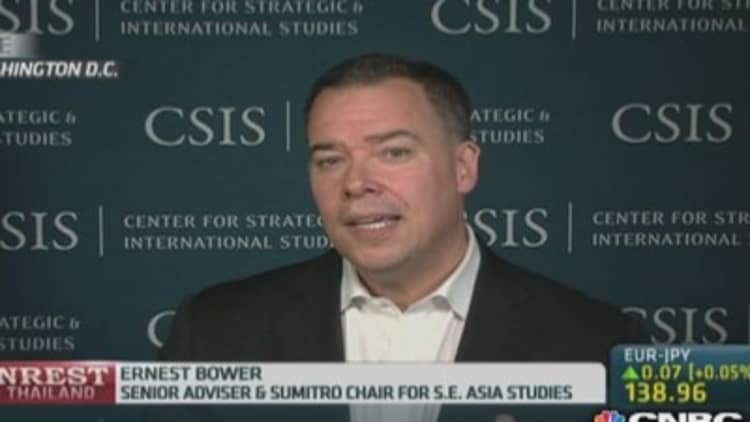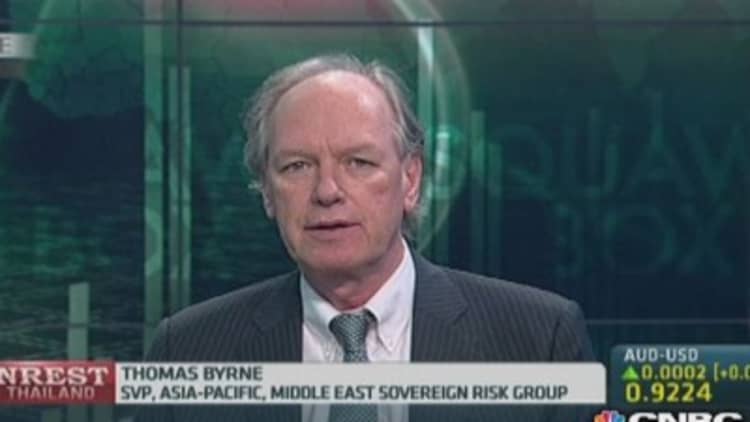
Business in Thailand usually isn't tarnished by politics, but the country's latest military coup comes in a drastically changed political milieu, with the Teflon status already showing scratches.
"This is quite different from coups we've seen earlier. This is a one-in-a-hundred-years type of political crisis," Ernest Bower, senior advisor at the Center for Strategic and International Studies said.
After more than seven months of political protests and two days of martial law, Thailand's army chief General Prayuth Chan-ocha declared the military had seized power in a coup. Media reports said the leaders of the pro-government Red Shirts had been arrested. The country has now faced a total of 19 military coups, 12 successful, since it became a constitutional monarchy in 1932.
Read MoreThailand's crisis:What you need to know
"It's about who will be in power when the royal succession takes place," Bower told CNBC, adding the military doesn't want to risk having pro-government forces in power during the handover.
King Bhumibol Adulyadej has headed Thailand's constitutional monarchy for over 60 years, but the 86-year-old's health is failing. While he is revered across the country, his son, the crown prince, is less popular.
"The 500-pound gorilla in the room is the health of the king, how long he'll be around and who will follow," Steve Vickers, CEO of Steve Vickers & Associates, a risk mitigation consultancy, told CNBC.
Some anti-government protestors believe the monarchy's stature is threatened by the popularity of Thaksin Shinawatra, the former prime minister ousted in a 2006 military coup and the brother of Yingluck Shinawatra, who was removed from the post earlier this month.
Read MoreThailand's growth outlook goes under the knife
"The (anti-government) Yellow Shirts think this is their last chance to 'fix things' before… the king passes away and we have a new monarch," Vickers said. "It's their last chance to change the constitution, to change the election system."
Another concern is the potential for violence as the pro-government Red Shirts are better organized than they were during the 2006 coup.
"The Red Shirts now appear to have the capacity not only to bring large-scale protests to the streets but also, we believe, to pursue a serious insurgency from its heartlands in the north of the country," Nomura said in a note Thursday. "If the Red Shirts conclude that they will never be allowed to prevail through the ballot box, direct action of one sort or another is likely to look to be the only option open to them."
In previous bouts of political turmoil, business in Thailand barely suffered more than a blip, but this time the economy is clearly suffering, with first quarter gross domestic product (GDP) contracting a larger-than-expected 2.1 percent on quarter. Many analysts have slashed their 2014 economic growth forecasts.
"If Thailand didn't have this heightened political unrest, the economy would have grown probably about 4-4.5 percent this year. Now we're looking at something between 1-2 percent," said Thomas Byrne, senior vice president in the sovereign risk group at Moody's.
He noted the turmoil has put around $60 billion worth of promised infrastructure projects on hold.
Read MoreIs martial law the last straw for Thai investors?
"They really need a government that can adopt a new budget and that can get the infrastructure spending up to the level they want it to be at. We think it's essential for the long-term competitiveness of the Thai economy," Byrne told CNBC.
It isn't clear how much the military's latest step will affect the financial markets.
"The Thai military has suggested that it is 'business as usual,' but coups tend to be unusual business," Vishnu Varathan, senior economist at Mizuho Bank said in a note Thursday.
The initially reacted negatively to the news, but then recovered. The U.S. dollar was fetching around 32.44 baht, off a high of around 32.59 after the coup was announced, compared with Thursday's pre-coup low of around 32.34.

Varathan expects baht bears may remain subdued as the central bank could "smooth" the currency's movements and as the coup suggests the potential for violence may remain subdued.
In the stock market, losses might not be drastic. The iShares MSCI Thailand Capped ETF fell a little more than 1 percent in U.S. trade Thursday.
That may be because funds have already pulled out. So far this year, foreign and domestic investors in Thailand mutual fund and exchange traded funds (ETF) have pulled out around $1.28 billion, according to data from Jefferies. Foreign investors yanked $379 million in the May 15-21 period, the data show. In 2013, foreign investors pulled around 194 billion baht, or $6 billion, from Thai shares, reversing the inflows from the previous four years.
—By CNBC.Com's Leslie Shaffer; Follow her on Twitter @LeslieShaffer1

